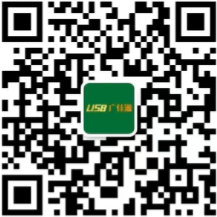 Mr. Chen:136-6225-2835
Mr. Chen:136-6225-2835
 Miss Chen:189-2385-0895
Miss Chen:189-2385-0895
USB 2.0A male 4-core solder wire type product with a total length of L=25mm and a white rubber core. USB 2.0A male solder wire type male head: white rubber core, which uses differential signals to transmit data for conventional models. USB 2.0 solder wire type male head 4-p terminal white rubber core with a total length of L=25mm is integrated, and the highest speed can reach 480Mb/S. It supports both main line power supply and self power supply modes

The product features a USB 2.0A male 4-core soldered wire with a total length of L=20.5 mm and a white rubber core. The USB 2.0A male soldered wire has a male head with a white rubber core, which uses differential signals to transmit data. The USB 2.0 soldered wire has a male head with a 4-p terminal and a white rubber core with a total length of L=20.5 mm and is integrated. It supports both main line power supply and self power supply modes, with a maximum speed of up to 480 Mb/S. In bus power mode, the device can receive up to 500mA of current and is designed to be backward compatible. When there are full speed (USB1.1) or low-speed (USB1.0) devices connected to a high-speed (USB2.0) host, the host can support them through separate transmission. Meanwhile, the highest achievable transfer speed level on a USB bus is determined by the slowest device on the bus, which includes the host, HUB, and USB functional devices, with soldered wires
Determine the male pins: Clearly identify the four pins of the USB 2.0A male head, generally corresponding to the positive pole of the power supply, the negative pole of the data supply, the positive pole of the data supply, and the negative pole of the power supply in order from left to right (facing the male head insertion end, with the pins facing up).
Welding the positive pole of the power supply: Align the red wire with the positive pole pin of the power supply corresponding to the male head, use an electric soldering iron to dip an appropriate amount of solder, and weld the wire and pin together to ensure a firm connection and no virtual soldering.
Welding the negative pole of the power supply: Weld the black wire to the negative pole pin of the male power supply using the same method as welding the positive pole of the power supply.
Welding data negative and positive poles: Weld the white and green wires to the data negative and positive pins of the male head respectively. Due to the high requirements for welding quality in data transmission, it is necessary to ensure that the solder joints are smooth and free of short circuits.
Inspection and Testing
After welding is completed, use pointed nose pliers to organize the solder joints and remove excess solder and burrs.
Use a multimeter to check for short circuits between each solder joint.
Insert the welded USB plug into a suitable device (such as a computer) and test whether it can recognize and transmit data normally. If the device cannot recognize it, there may be welding issues that require re inspection and welding.
Contact person:
Mr. Chen 136-6225-2835 (same WeChat account)
Miss Chen 189-2385-0895 (same WeChat account)
Chen Weiting 135-3824-4786 (same WeChat account)
Chen Weihao 139-2459-4393 (same WeChat account)
Address:
Building 10, Hongxing Gebu Qixiang, Songgang Town, Bao'an District, Shenzhen, Guangdong Province
 |
 |
| Technology 1 | Technology 2 |